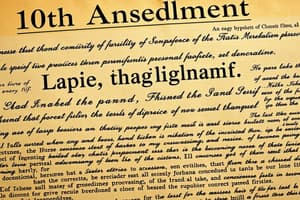Podcast
Questions and Answers
The 10th Amendment states that powers not given to the federal government belong to the states or the people.
The 10th Amendment states that powers not given to the federal government belong to the states or the people.
True (A)
Which of the following best describes police power?
Which of the following best describes police power?
- The power of the federal government to enforce laws.
- A shared power between states and the federal government.
- The power of Congress to regulate trade.
- The power of states to protect citizens' health and safety. (correct)
What is the purpose of the Necessary and Proper Clause?
What is the purpose of the Necessary and Proper Clause?
To allow Congress to make laws necessary for executing its powers.
The Constitution gives Congress the power 'to regulate _____ among the several states.'
The Constitution gives Congress the power 'to regulate _____ among the several states.'
The Congress has unlimited power to pass any law it wants without restriction.
The Congress has unlimited power to pass any law it wants without restriction.
What has been one major source of disagreement between the states and Congress?
What has been one major source of disagreement between the states and Congress?
What does the 10th Amendment ensure?
What does the 10th Amendment ensure?
What is the Necessary and Proper Clause?
What is the Necessary and Proper Clause?
States have a federal police power.
States have a federal police power.
What power does Congress have related to commerce?
What power does Congress have related to commerce?
Which areas has Congress used its commerce power to pass laws?
Which areas has Congress used its commerce power to pass laws?
The policing power is primarily the responsibility of the ______.
The policing power is primarily the responsibility of the ______.
Flashcards are hidden until you start studying
Study Notes
The 10th Amendment
- Ensures that powers not granted to the federal government by the Constitution are reserved for the states or the people.
- Establishes a clear distinction of powers within the federalist system of governance.
Federalism and Power Distribution
- The U.S. Constitution creates a federalist system where power is shared between state and federal governments.
- States consented to delegate specific powers to the federal government, while all other powers are retained by the states.
Necessary and Proper Clause
- The Constitution includes the Necessary and Proper Clause allowing Congress to legislate for executing its enumerated powers.
- This clause has led to ongoing disputes regarding the interpretation of "necessary and proper" in federal actions.
Congressional Authority
- Congress often claims powers not explicitly listed in the Constitution by linking new actions to existing enumerated powers.
- Tensions arise when states challenge federal laws as overreach, arguing that those powers are exclusively state rights.
State Police Power
- States possess police power to protect citizens' health, safety, and welfare by enacting regulations such as water treatment standards.
- This power allows states to limit individual rights for the greater public good.
Absence of Federal Police Power
- Unlike states, the federal government lacks inherent police power to enact laws related to health and safety.
- However, Congress can pass laws that resemble state police powers if they relate to a federal constitutional power.
Types of Congressional Actions
- Expressed Power: Directly stated powers in the Constitution that Congress can exercise.
- Necessary & Proper Action: Actions that are justifiably linked to an expressed power, considered valid.
- Overreach: Any action taken by Congress that is not related to constitutional powers is viewed as overreach.
Commerce Clause
- Grants Congress the authority to regulate interstate commerce—business activities crossing state lines.
- Broadly interpreted to include regulation related to food safety, child labor, and civil rights through commerce power.
- Congress's use of commerce power has sparked significant debate over state vs. federal authority regarding local matters.
The 10th Amendment
- The 10th Amendment reserves powers not delegated to the federal government for the states or the people.
Prime-Time Power Struggle
- The U.S. has a federalist system, where state governments share power with a central federal government.
- The Constitution specifies the powers granted to the federal government; all other powers are retained by the states.
- The Necessary and Proper Clause allows Congress to create laws necessary for executing its powers, leading to ongoing debates about its interpretation.
No, Really…It’s Necessary
- Congress often seeks to pass laws not explicitly mentioned in the Constitution, linking these laws to powers that are clearly defined.
- States may challenge federal actions they believe overstep congressional authority, claiming that certain issues should remain within state jurisdiction.
Police Power in Action
- States have police powers to set health and safety standards, such as regulations for water treatment plants.
- States can limit individual rights for public welfare, like imposing speed limits to ensure road safety.
- The federal government lacks a defined police power but can still enact laws under the scope of its constitutional powers unless deemed overreach.
The Reach of Congress’s Power
- Congress can legislate broadly as long as a law is related to its constitutional powers, avoiding classification as overreach.
Commerce Controversy
- A significant conflict arises from Congress using its commerce power to legislate in areas traditionally governed by state police powers.
- The Constitution grants Congress the authority to regulate interstate commerce, which includes trade crossing state lines.
- Over time, Congress has applied its commerce authority to pass laws regarding food safety, child labor, and civil rights.
Studying That Suits You
Use AI to generate personalized quizzes and flashcards to suit your learning preferences.




